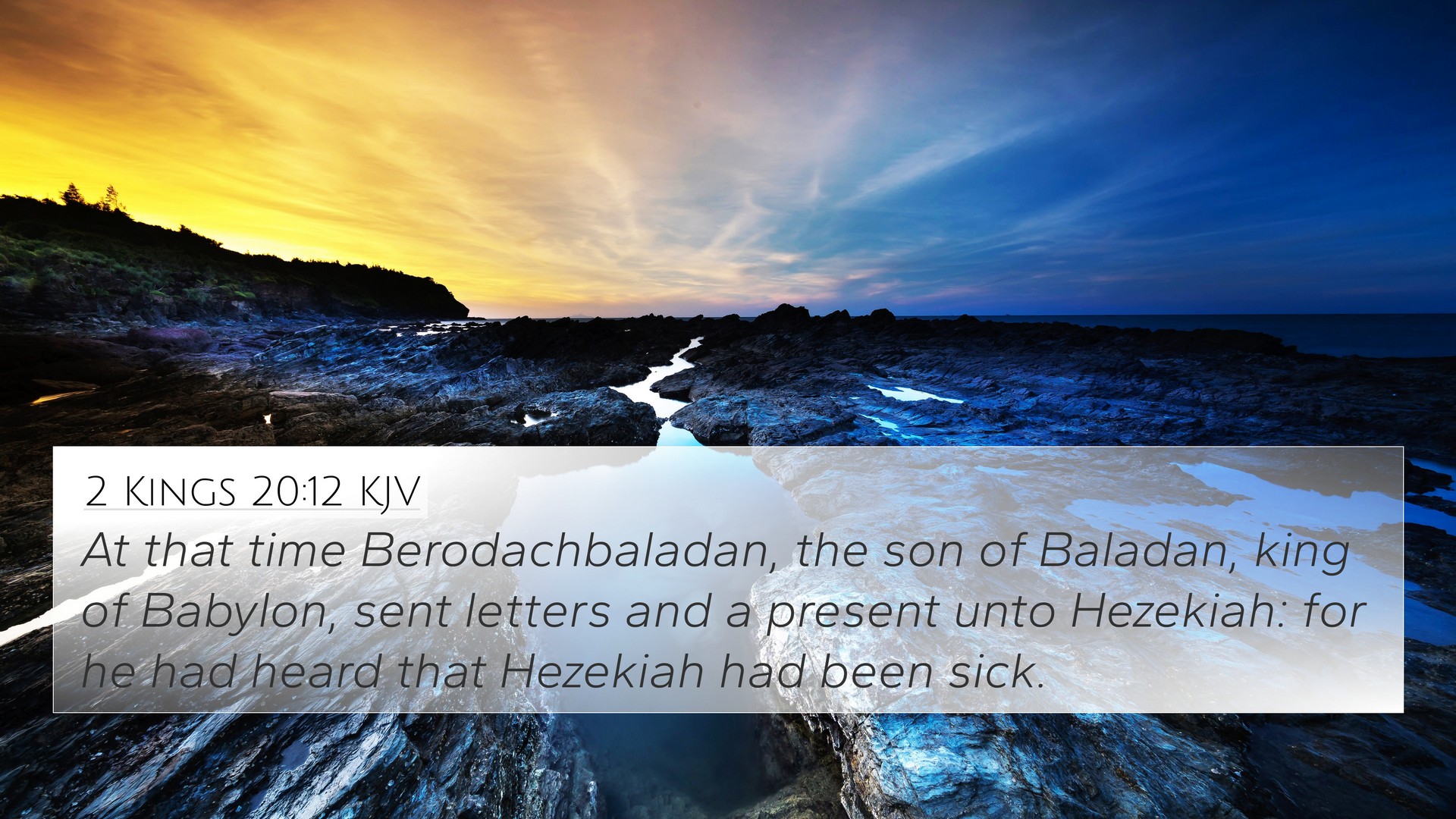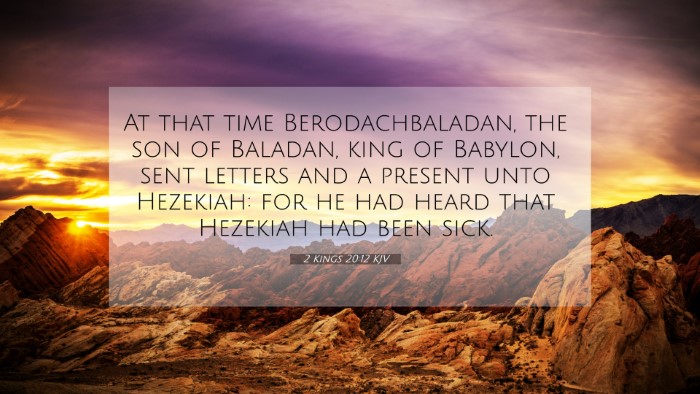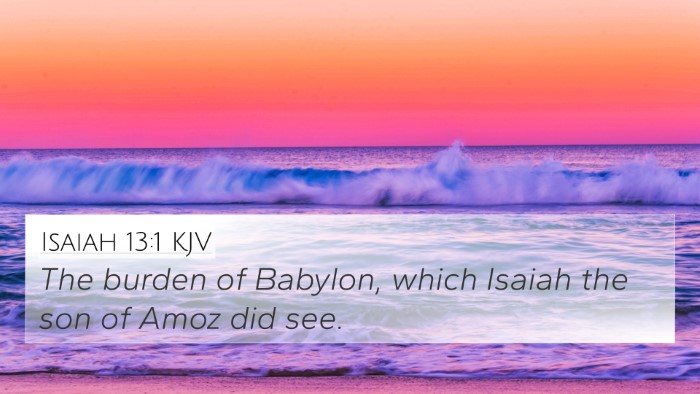Old Testament
Genesis Exodus Leviticus Numbers Deuteronomy Joshua Judges Ruth 1 Samuel 2 Samuel 1 Kings 2 Kings 1 Chronicles 2 Chronicles Ezra Nehemiah Esther Job Psalms Proverbs Ecclesiastes Song of Solomon Isaiah Jeremiah Lamentations Ezekiel Daniel Hosea Joel Amos Obadiah Jonah Micah Nahum Habakkuk Zephaniah Haggai Zechariah Malachi2 Kings 20:12 Similar Verses
2 Kings 20:12 Cross References
At that time Berodachbaladan, the son of Baladan, king of Babylon, sent letters and a present unto Hezekiah: for he had heard that Hezekiah had been sick.
Uncover the Rich Themes and Topics of This Bible Verse
Listed below are the Bible themes associated with 2 Kings 20:12. We invite you to explore each theme to gain deeper insights into the Scriptures.
2 Kings 20:12 Cross Reference Verses
This section features a detailed cross-reference designed to enrich your understanding of the Scriptures. Below, you will find carefully selected verses that echo the themes and teachings related to 2 Kings 20:12 KJV. Click on any image to explore detailed analyses of related Bible verses and uncover deeper theological insights.

2 Chronicles 32:31 (KJV) »
Howbeit in the business of the ambassadors of the princes of Babylon, who sent unto him to enquire of the wonder that was done in the land, God left him, to try him, that he might know all that was in his heart.
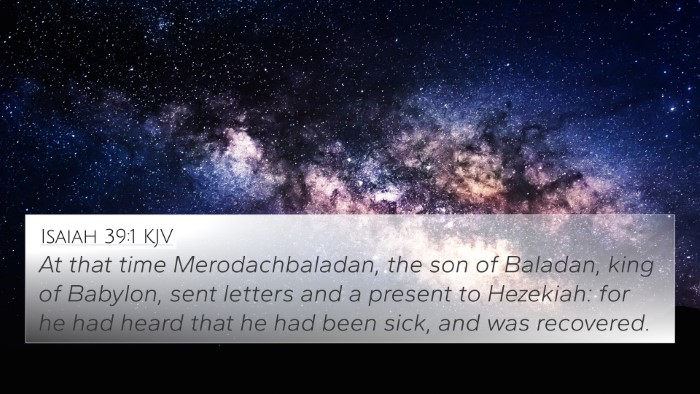
Isaiah 39:1 (KJV) »
At that time Merodachbaladan, the son of Baladan, king of Babylon, sent letters and a present to Hezekiah: for he had heard that he had been sick, and was recovered.
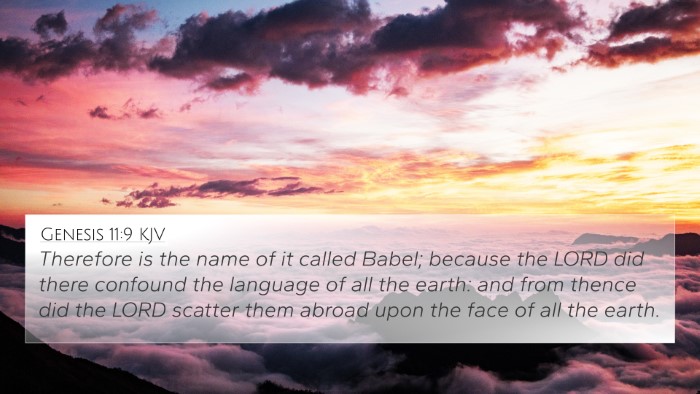
Genesis 11:9 (KJV) »
Therefore is the name of it called Babel; because the LORD did there confound the language of all the earth: and from thence did the LORD scatter them abroad upon the face of all the earth.
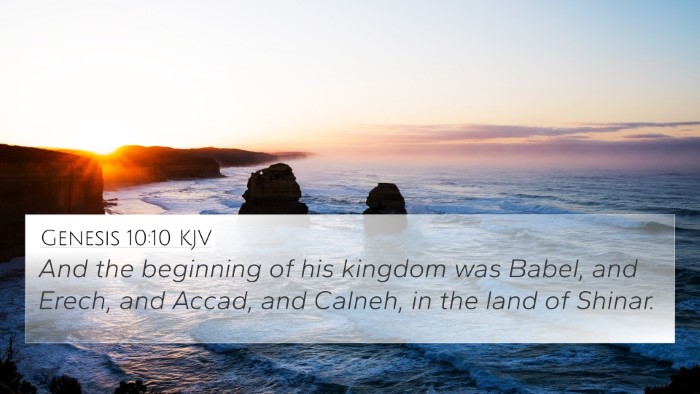
Genesis 10:10 (KJV) »
And the beginning of his kingdom was Babel, and Erech, and Accad, and Calneh, in the land of Shinar.

2 Samuel 10:2 (KJV) »
Then said David, I will show kindness unto Hanun the son of Nahash, as his father showed kindness unto me. And David sent to comfort him by the hand of his servants for his father. And David's servants came into the land of the children of Ammon.
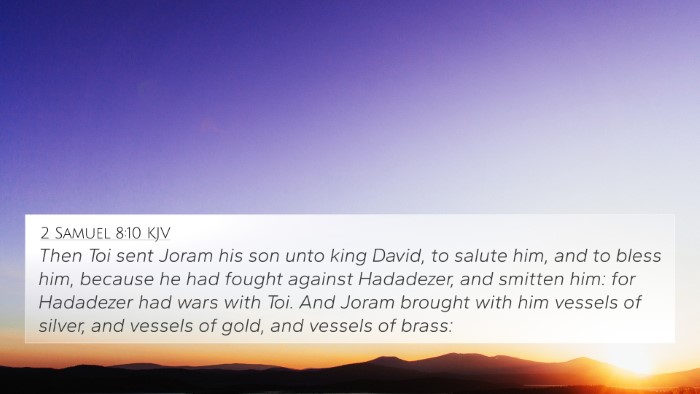
2 Samuel 8:10 (KJV) »
Then Toi sent Joram his son unto king David, to salute him, and to bless him, because he had fought against Hadadezer, and smitten him: for Hadadezer had wars with Toi. And Joram brought with him vessels of silver, and vessels of gold, and vessels of brass:
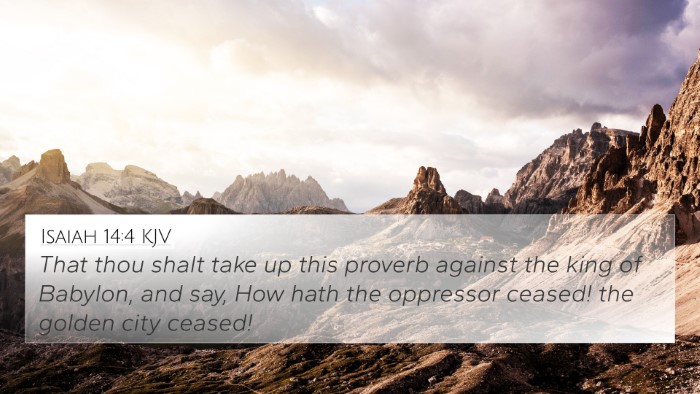
Isaiah 14:4 (KJV) »
That thou shalt take up this proverb against the king of Babylon, and say, How hath the oppressor ceased! the golden city ceased!
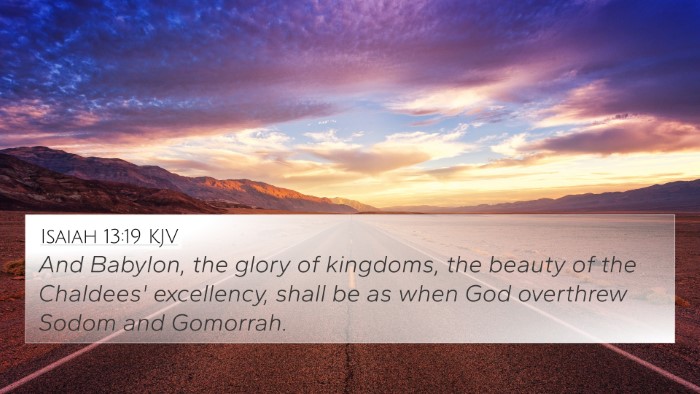
Isaiah 13:19 (KJV) »
And Babylon, the glory of kingdoms, the beauty of the Chaldees' excellency, shall be as when God overthrew Sodom and Gomorrah.
2 Kings 20:12 Verse Analysis and Similar Verses
Bible Verse: 2 Kings 20:12
In this passage, we find an important moment in the life of King Hezekiah when he receives a visit from Merodach-baladan, the son of Baladan, the king of Babylon. The verse states, "At that time, Merodach-baladan son of Baladan, king of Babylon, sent letters and a present to Hezekiah; for he heard that Hezekiah had been sick, and was recovered."
The visit signifies the political intrigue of the time and the growing influence of Babylon, foreshadowing future events concerning Judah and Israel.
Commentary Insights
- Matthew Henry: He emphasizes that Hezekiah's health brought about a desire for Babylon's king to establish a goodwill relationship, viewing it as a moment of pride for Hezekiah that ultimately led to his downfall.
- Albert Barnes: Barnes emphasizes the political motives behind the visit and presents it as an effort by Babylon to strengthen ties with Judah, cautioning against complacency in spiritual matters amidst favorable physical conditions.
- Adam Clarke: Clarke explains that Merodach-baladan's action reflects the emerging power of Babylon, suggesting a strategic alliance that Hezekiah welcomed unwisely, ignoring the deeper spiritual implications of the visit.
Key Themes and Connections
- Political Alliances: The visit serves as a critical point in exploring the theme of political alliances in the Bible, as Babylon aims to gain favor with Judah.
- Health and Recovery: This reflects God's mercy on Hezekiah, paralleling instances where recovery serves as a foundation for future spiritual decisions.
- Pride and Humility: Hezekiah's acceptance of gifts can be viewed as a moment of pride which ultimately leads to his downfall, a theme echoed throughout scripture.
Cross-references for Deeper Study
- Isaiah 39:1-3 - Record of the same event and its significance.
- 2 Chronicles 32:31 - Explains how Hezekiah's behavior affected his relationship with other nations.
- Proverbs 16:18 - "Pride goes before destruction," which highlights the potential failing that arises from arrogance.
- 2 Kings 20:1 - The context of Hezekiah’s illness before this incident.
- Isaiah 38:9-20 - Hezekiah's song of thanksgiving; focusing on his recovery, reflective of God's salvation.
- Jeremiah 51:1-14 - Babylon’s eventual doom, showing the repercussions of its arrogance.
- Romans 12:3 - A call for humility, reminding followers to not think of themselves too highly, which echoes the lessons in Hezekiah's story.
Practical Applications
Understanding this passage urges believers to reflect upon their own connections with others, especially in terms of spiritual integrity versus political expediency.
Additionally, the interpretations provide a framework for utilizing tools for Bible cross-referencing and understanding relationships between scriptural texts. Believers can incorporate these insights into their study and sermon preparation by drawing parallels between different biblical events and themes.
Bible Cross-Reference Tools
- Bible concordance for finding themes and verses.
- Cross-reference Bible study methods to see related verses.
- Bible reference resources can aid in deeper understanding.
In summary, 2 Kings 20:12 presents King Hezekiah's story as a pivotal point, unveiling the complexities of political interactions and the corresponding spiritual lessons. This highlights the importance of using connecting Bible scriptures for comprehensive interpretation and understanding.
